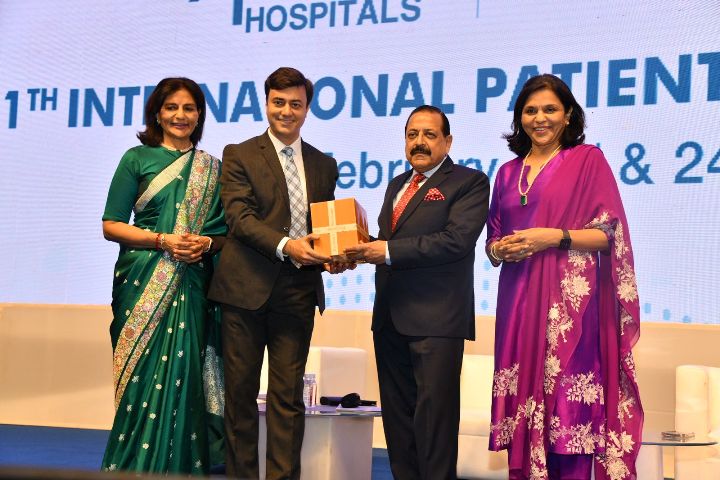Need for optimum integration between existing and newer tools of patient care: Dr Jitendra Singh
Dr Jitendra Singh thanked the organisers for taking the lead for a synergised and equitable relationship with the government for optimum outcomes.

- Country:
- India
Union Minister of State (Independent Charge) Science & Technology; MoS PMO, Personnel, Public Grievances, Pensions, Atomic Energy and Space, Dr Jitendra Singh today said that Artificial Intelligence is revolutionising clinical medicine at a very fast pace and there is an urgent need for optimum integration between the existing and the newer tools of patient care.
At the same time, he said, integration is also required at a different level between the public and private sectors on the one hand and on the other hand among various systems of medical practice combining allopathy with AYUSH to achieve the envisaged health goals through a synergised approach.
Speaking as chief guest in the inaugural session of 2-day "International Patient Safety Conference 2024" in Bengaluru, Dr Jitendra Singh said, India’s recent success stories which have been hailed worldwide including the vaccine story, have proved beyond evidence that working in silos or in isolation has its limitations and further growth from here on is possible only through an integration at multiple levels.
Dr Jitendra Singh said, for the first time after Independence, the healthcare sector has received top priority under Prime Minister Shri Narendra Modi. PM Modi spoke about Digital Health from the ramparts of the Red Fort on Independence Day, he recalled.
A renowned diabetologist himself, Dr Jitendra Singh called for strong Public Private extended integration for optimum results. He gave the example of a recently introduced Ph.D course in Biosciences, which is multiple in nature and even B.Tech or M. Tech streams could join.
Elaborating further on integration of various streams of healthcare, Dr Jitendra Singh pointed out that during the COVID even the West started looking up to India in search of immunity building techniques drawn from Ayurveda, Homoeopathy, Unani, Yoga, Naturopathy and other oriental alternatives. He said, however, even after the COVID phase passes out, an optimum integration and synergism of different streams of medical management are the key to successful management of various diseases and disorders which may not be otherwise completely amenable to treatment by any single stream of medicine or the treatment given in silos.
Dr Jitendra Singh said that ever since Shri Narendra Modi took over as Prime Minister of India in 2014, he has brought to the centre stage the virtues of indigenous systems of medical management. He said, it was PM Modi who brought a unanimous resolution in the United Nations to observe International Day of Yoga, as a result of which Yoga has reached virtually every household across the world. Again it was PM Modi’s initiative that we have celebrated the International Year of Millets in 2023 to spread the virtues of Millets and other coarse grains to the world.
Referring to the PPP model, Dr Jitendra Singh said, India has witnessed investment of over Rs 1,000 crore in Space Startups in the last nine months of the current financial year from April to December 2023. This has been possible because in a bold decision taken by Prime Minister Shri Narendra Modi, India's Space sector has been opened up for private players, as a result of which there is an overwhelming response from Industry as well as investors from private sector, the Minister added.
Similarly, Dr Jitendra Singh said that our Bio-economy witnessed double digit growth rate year-on-year in the last 9/10 years under the leadership of Prime Minister Modi. “In 2014, India’s bioeconomy stood at just about $10 Billion. This fiscal we are likely to touch $150 billion and we look forward to having $300 Billion by 2030,” he said.
Dr Jitendra Singh said, India has made rapid strides in the last 8/9 years. “We had just 55 (Biotech) Startups in 2014, now we have more than 6,000,” he said. Today there are over 3,000 Agritech Startups and are very successful in areas like Aroma Mission and Purple Revolution.
Stating that the "Anusandhan National Research Foundation" will pave the way for a greater PPP model in scientific research, Dr Jitendra Singh said the NRF will catapult us to the league of a handful of Developed nations pioneering new research in new frontiers. “NRF budget envisions a spending of Rs. 50,000 crore over five years, out of which over 70% will come from non-government sources, including domestic as well as outside sources,” he said.
Dr Jitendra Singh thanked the organisers for taking the lead for a synergised and equitable relationship with the government for optimum outcomes. He also thanked them for taking the lead in bringing a new genre of AI and other technological tools for patient and clinical medicine.
Dr Jitendra Singh said, Apollo Hospitals has also played a pioneering role fulfilling the vision of its founder Dr Pratap Reddy in addressing societal needs during the tough times of COVID.
(With Inputs from PIB)










